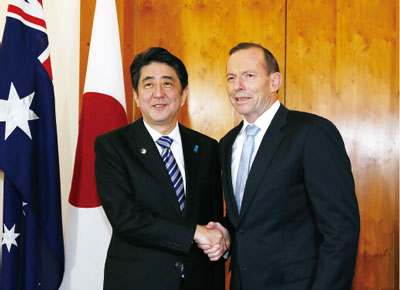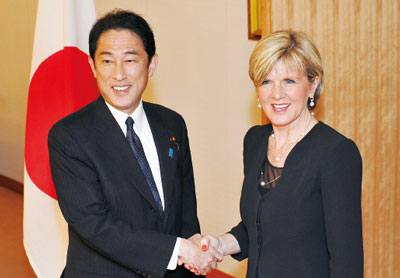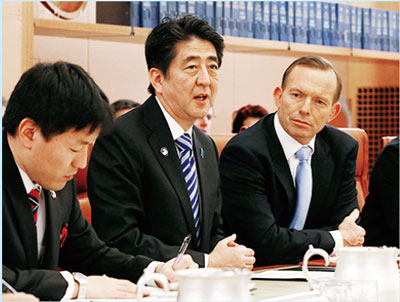Diplomatic Bluebook 2015
Chapter 2
Japan’s Foreign Policy that Takes a Panoramic Perspective of the World Map
5.Oceania
(1) Australia
A. General Overview
In Australia, the Coalition (Liberal Party and National Party) won the September 2013 federal election, defeating the Labor Party and returned to power after six years in opposition. Liberal Party leader Tony Abbott was appointed as prime minister.
Sharing fundamental values and strategic interests, Japan and Australia are strategic partners in the Asia-Pacific region. In particular, in recent years, the relationship between the two countries has been defined as a “special relationship” and has been developing rapidly, along with cooperative relations in the fields of security and defense. In 2014, Japan and Australia held seven summit meetings and five foreign ministers’ meetings. Prime Minister Abbott visited Japan in April, and Prime Minister Abe visited Australia in July, where the two leaders issued a joint statement entitled “Special Strategic Partnership for the 21st Century.” In addition, the two leaders held talks on many occasions of international conferences, including the UN General Assembly in September and the ASEAN-related Summit Meetings in November. Moreover, Foreign Minister Kishida and Australian Foreign Minister Julie Bishop held talks on such occasions as the ASEAN-related Foreign Ministerial Meetings in August and the APEC Ministerial Meeting in November. The Japan–Australia EPA entered into force in January 2015 and the mutually complementary economic relations including trade and investment are being strengthened further.
 Japan–Australia Summit Meeting (July 8, Australia; Source: Cabinet Public Relations Office)
Japan–Australia Summit Meeting (July 8, Australia; Source: Cabinet Public Relations Office)
 Japan–Australia Foreign Ministers’ Meeting (June 11, Tokyo)
Japan–Australia Foreign Ministers’ Meeting (June 11, Tokyo)
B. Security Cooperation
Security and defense cooperation between the two countries has been developing rapidly. Up to 2013, developments in this area included the Japan–Australia Joint Foreign and Defense Ministerial Consultations (2+2) and other bilateral consultations on regular basis; the Japan–Australia Acquisition and Cross-servicing Agreement, which promotes cooperation between the two countries in such areas as joint exercises, UN peacekeeping operations, and overseas disaster relief operations; and the conclusion of the Japan–Australia Information Security Agreement, which stipulates the procedures required to protect confidential information exchanged by the Japanese and Australian governments that needs to be safeguarded for reasons of national security.
In June 2014, the fifth round of 2+2 consultations took place for the first time since the inauguration of the respective administrations of Prime Minister Abe and Prime Minister Abbott. During the meeting, the two countries confirmed the substantive conclusion of negotiations on an agreement concerning the transfer of defense equipment and technology. Ministers also discussed preparations for joint research on marine hydrodynamics as an initial area of science and technology cooperation.
Moreover, when Prime Minister Abe visited Australia in July, the two leaders signed the Agreement between the Government of Japan and the Government of Australia concerning the Transfer of Defence Equipment and Technology, which will contribute to deepened cooperation between the two countries through joint research, development, and production of defense equipment and technology. In addition, they agreed to commence negotiations with a view to concluding an agreement to facilitate joint operations and exercises.
In November, when Prime Minister Abe attended the G20 Summit in Brisbane, the Japan–Australia–U.S. Summit Meeting took place for the first time in seven years, with Prime Minister Abbott and President Obama. At the meeting, the three leaders expressed their commitment to deepening the trilateral partnership among Australia, Japan and the U.S. to secure a peaceful, stable, and prosperous future in the Asia-Pacific region. More specifically, they affirmed that the three countries would undertake cooperation in fields including joint exercises, maritime security, peacekeeping, humanitarian assistance and disaster relief, and defense equipment and technology.
C. Economic Relations
Mutually complementary economic relations between the two countries are developing steadily, primarily in the form of exports of Japanese manufactured goods and imports of Australian resources and agricultural products. Most notably, the Japan–Australia EPA entered into force in January 2015, after the series of negotiations which began in 2007. In the future, it is anticipated that the economic relationship between the two countries will become even stronger, through liberalization and facilitation of trade in goods and services, as well as increased opportunities for investment. Specifically, enhanced cooperation is expected in a wide range of fields, including food supply, energy and mineral resources, the movement of natural persons, competition and consumer protection, intellectual property, and government procurement.
The two countries also cooperate closely within the WTO and other multilateral frameworks, as well as in negotiations over broader regional economic partnerships, such as the Trans-Pacific Partnership Agreement (TPP) and the Regional Comprehensive Economic Partnership (RCEP).
D. Cultural and People-to-People Exchange
Australia has pro-Japanese foundations, with the world’s fourth-largest number of people studying Japanese and more than 100 sister city relationships with municipalities in Japan. In 2014, a pilot program called the New Colombo Plan was launched in Japan by Prime Minister Abbott during his visit in April. This plan aims to increase knowledge of the Asia-Pacific region and to enhance people-to-people exchanges as well as university ties through overseas study or internships involving Australian undergraduates. It is expected that this will be the catalyst for further strengthening the bilateral cultural and people-to-people exchanges in the future.
E.Cooperation in the International Community
Both countries are strengthening cooperation at various levels, in order to play a proactive role for the stable development of the region. In 2014, they engaged in even closer cooperation within regional cooperation frameworks such as G20, EAS, and APEC.
Moreover, having been elected as a two-year term non-permanent member of the UN Security Council in 2013, Australia enhanced cooperative relations with Japan in 2014. Japan and Australia will continuously facilitate close communication about cooperation within the UN, including the Security Council reform.
(2) New Zealand
A. General Overview
The National Party won the general election that took place in New Zealand in September 2014, with Prime Minister John Key winning a third consecutive term in office.
As partners in the Asia-Pacific region who share fundamental values including democracy and a market economy, Japan and New Zealand have maintained good relations for many years. In particular, in 2013, the foreign ministers of Japan and New Zealand issued a joint statement on a strategic cooperative partnership, laying the foundations for further strengthening the relationship between the two countries.
B. Bilateral Relationship
In July 2014, Prime Minister Abe paid a visit to New Zealand, the first visit to the country by a Japanese prime minister in 12 years. The two leaders issued a joint press release on enhancing cooperation between the two countries, in which they confirmed that Japan would strengthen its bilateral cooperation with New Zealand, its strategic cooperative partner in the Asia-Pacific region, in areas including the economy, security and defense cooperation, and people-to-people exchanges, as well as cooperating on issues involving the region and the international community as a whole.
Other high-level reciprocal visits also flourished in 2014. In February State Minister for Foreign Affairs Mitsuya visited New Zealand to attend a memorial service commemorating the third anniversary of the Christchurch earthquake. In May, Trade Minister Tim Groser visited Japan and held talks with Foreign Minister Kishida, where the two ministers affirmed that they would enhance cooperation focused on the establishment of economic rules in the Asia-Pacific region, including the TPP agreement and the RCEP.
Furthermore, while attending the APEC Ministerial Meeting in Beijing in November, Foreign Minister Kishida held talks with Foreign Minister Murray McCully, at which they affirmed their commitment to further strengthening the Strategic Cooperative Partnership between the two countries.
C. Economic Relations
Japan and New Zealand have a mutually complementary economic relationship. The Sixth Conference on the Japan–New Zealand Partnership in Food and Agriculture was held in December 2014, attended by government officials and companies from both countries. At the conference, discussions focused on the potential for cooperation in agricultural fields, including dairy and livestock farming.
The two countries also cooperate closely within the WTO and other multilateral frameworks, as well as in negotiations over broader regional economic partnerships, such as the TPP agreement and the RCEP.
D.Cooperation in the International Community
While further enhancing cooperation in such regional cooperative frameworks as the Pacific Islands Leaders Meeting (PALM), the EAS, and the ASEAN Regional Forum (ARF), the two countries play a proactive role in supporting regional stability and development, including through initiatives focused on economic development in Afghanistan and in Pacific Island countries and regions.
Moreover, New Zealand has been elected as a non-permanent member of the UN Security Council for the 2015-2016 term, so the two countries will continue to maintain a cooperative relationship within the UN, including in regard to matters concerning Security Council reform.
E. People-to-People Exchange
In 2014, another 280 or so Australian and New Zealand high school and university students visited Japan as part of the JENESYS 2.0 youth exchange program. They visited Tokyo and provincial cities and gained a deeper understanding of Japan through interaction with Japanese high school and university students.
In addition, support for establishing networks among existing sister cities has been enhanced, with the objective of promoting mutual understanding among young people. Furthermore, in the field of sport, the Government of New Zealand commenced a new initiative called Game on English, which combines rugby training with English language education for Japanese students. The launch ceremony for the program was held during Prime Minister Abe’s visits to New Zealand in July, with both prime ministers in attendance.
(3) Pacific Island Countries
A. General Overview
Pacific Island countries and regions, which share the Pacific Ocean with Japan, have deep historical ties with Japan and are important partners in terms both of cooperation in the international community and the supply of natural resources. Japan’s relationships with Pacific Island countries and regions are being further enhanced by its hosting of the Pacific Islands Leaders Meeting (PALM) and participation in the Pacific Islands Forum (PIF) Post-Forum Dialogue, as well as high-level visits in both directions.
B.The Pacific Islands Leaders Meetings (PALMs)
Japan has hosted PALM every three years since 1997. Japan has been building close cooperative relationships with through candid discussion at summit-level on common challenge faced by the Pacific Island countries associated with their small size and land distribution over a wide area, their distance from international markets, and the fact that they are vulnerable to environmental changes including natural disasters and climate change. The PALM has been held six times to date, with the Seventh Pacific Islands Leaders Meeting (PALM 7) due to take place in Iwaki City, Fukushima Prefecture in May 2015.
Moreover, since 2010, Japan has also hosted a PALM Ministerial Interim Meeting in the subsequent year of the PALM, with the participation of foreign minister level from the pacific island countries, in order to follow up on the previous PALM and undertake consultations ahead of the next PALM.
In December 2014, 13 young administrative officials in charge of disaster prevention policy from the Pacific Island countries were invited to Japan, and they took part in meetings in Tokyo and Iwaki City, Fukushima Prefecture with representatives of relevant ministries and other organizations.
C. High-Level Visits
In July 2014, Prime Minister Abe visited Papua New Guinea for the first time as Japanese prime minister in 29 years. The leaders of the two countries issued a joint statement confirming that they would develop their long-standing friendly and cooperative relationship into a comprehensive partnership for regional stability and prosperity. In terms of economic relations, exports of liquefied natural gas (LNG) from Papua New Guinea to Japan began in June 2014, contributing not only to Papua New Guinea’s economic growth, but also to the diversification of Japan’s sources of energy supply.
In 2014, Christopher Loeak, President of the Republic of Marshall Islands, and Emanuel Anny Mori, President of the Federated States of Micronesia, visited Japan and held talks with Prime Minister Abe in February and November respectively. Moreover, Tommy Remengesau, Jr., President of Palau, visited Japan in December and held talks with Prime Minister Abe. During this meeting, Prime Minister Abe expressed his gratitude to Palau for its cooperation with the preparations for the visit to Palau by Their Majesties the Emperor and Empress of Japan, which is due to take place in 2015. In addition, he affirmed that he would cooperate with his fellow co-chair of PALM 7, President Remengesau, to ensure the success of the meeting.
Furthermore, in February, State Minister for Foreign Affairs Mitsuya visited Tonga and paid a courtesy call on Prime Minister Sialeʻataongo Tuʻivakanō. In September, Parliamentary Vice-Minister for Foreign Affairs Takashi Uto visited Papua New Guinea and the Solomon Islands, where he held talks with key figures in the governments of both countries, including Papua New Guinea’s Minister for Foreign Affairs and Immigration Rimbink Pato and Prime Minister Gordon Darcy Lilo of the Solomon Islands. In October, Parliamentary Vice-Minister for Foreign Affairs Nakane visited Palau as a special envoy of the Prime Minister to attend a ceremony to mark the 20th anniversary of the country’s independence.
D.Relationship with the Pacific Islands Forum (PIF)
In July 2014, the PIF Post Forum Dialogue took place in Palau, attended by the member countries of the PIF (14 Pacific Island countries, Australia, and New Zealand), along with major donor countries such as Japan, the U.S., China, and France. Parliamentary Vice-Minister for Foreign Affairs Seiji Kihara represented Japan, attending as a special envoy of the Prime Minister. During this meeting, Parliamentary
Vice-Minister Kihara stated that Japan and the Pacific Island countries are partners who share the Pacific Ocean and announced that, as a fellow island nation, Japan intended to undertake cooperation aimed at the sustainable development and use of the ocean and its resources. Moreover, he requested the leaders to participate in and cooperate for PALM 7. Parliamentary Vice-Minister Kihara also took this opportunity to hold talks with President Remengesau of Palau, Prime Minister Tuilaepa Sailele of Samoa, Prime Minister Toke Talagi of Niue, President Mori of the Federated States of Micronesia, and Marshall Islands Health Minister Phillip Muller.
E. The Fiji Situation
After a military coup d’état in 2006, Fiji was suspended its membership of the PIF and the commonwealth, and it has been called for taking steps toward democratization. In September 2014, the first general elections since the coup d’état were held, taking place in a fair and democratic manner. Japan dispatched election observers to the Multinational Observer Group (MOG) to contribute to ensuring that the election took place peacefully. This general election was a crucial step toward ensuring that democracy was firmly consolidated in Fiji. Japan will continue to support Fiji’s efforts to promote democratization and achieve economic development.
― Special Relationship between the Two Leaders Viewed from the Eyes of an Interpreter ―
In recent years, Japan and Australia have been building closer relations as strategic partners sharing basic values and strategic interests in the Asia-Pacific region. In this “special relationship”, so as defined at the July 2014 bilateral summit meeting between Japan and Australia, the two countries have not only deepened their economic ties including through the entry into force of the Japan-Australia Economic Partnership Agreement (EPA), but also advanced their security and defense cooperation at a rapid pace by putting into effect the Acquisition and Cross-Servicing Agreement (ACSA), Agreement on the Security of Information (ISA), and Agreement Concerning the Transfer of Defense Equipment and Technology.
Underlying such further advancement of Japan-Australia relations was the strong trust between Japanese Prime Minister Shinzo Abe and Australian Prime Minister Tony Abbott, who held meetings as many as seven times in 2014 alone. When I traveled to Australia as Prime Minister Abe’s interpreter in July 2014, I witnessed how close the relationship between the two prime ministers actually is. For example, during the time in Australia, the two leaders had dinner together in three consecutive evenings where Prime Minister Abe was treated with warm Australian hospitality. This is quite unusual for an overseas visit, as in most cases of the sort, national leaders join each other for a meal only once. Moreover, on the flight of the Australian government aircraft to Western Australia to visit a mine site in Pilbara, the two prime ministers had talks privately for more than three hours. The intimacy of this level gave me quite a challenge as an interpreter just to keep up with their conversation. Calling each other by their first names, they would cover a wide range of topics from Australian wines and cycling as Prime Minister Abbott’s hobby, to the history of their hometowns and work-related matters as both national leaders. They also frankly exchanged opinions on the world affairs and diplomatic issues of mutual importance, while giving each other advice in a way that looked as if they were a real family.
 The author (left) interpreting for Japanese Prime Minister Abe (center) attending a National Security Committee security meeting together with Australian Prime Minister Abbott (right) while visiting Australia (July 2014)
The author (left) interpreting for Japanese Prime Minister Abe (center) attending a National Security Committee security meeting together with Australian Prime Minister Abbott (right) while visiting Australia (July 2014)
Every day during the visit was a test to my interpretation skills, as I would have to keep conscious of providing quick and accurate support to facilitate the up-tempo back-and-forth conversations between “Shinzo” and “Tony”, who were in a very close relationship of trust. Though it turned as an arduous and restless visit, it was a very rewarding experience for me as an interpreter to be able to feel firsthand the strong connection between the two prime ministers. I reckon my duty as an interpreter should be considered accomplished, if at all I was able to help add to their trust relationship in the end.
Atsuyuki Fujinuma,
Deputy Director, Policy Coordination Division,
Foreign Policy Bureau

